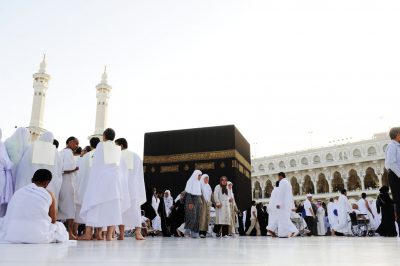Muslims hold the sacred memory of Prophet Abraham and his son Ishmael (peace be upon them) with extreme reverence, as they were models of supreme sacrifice. Jews and Christians also hold Abraham’s sacrifice as of profound symbolic meaning.
But there are two significant factors that set off the Muslim belief from that of the Jews and the Christians:
One, from the Muslim point of view it was Ishmael, the firstborn of Abraham who was to be sacrificed, whereas the Jews and Christians believe that it was Isaac the second son.
Two, the Quran teaches that the sacrifice was not the decision of Abraham’s alone; but his son’s too, as Ishmael was equally prepared to willingly submit to God’s command for the sacrifice.
The Story in the Bible
In the Bible, Isaac was kept in the dark about God’s command and he did not know that his father had received a command from God to sacrifice him.
The above two facts are evident from the verses giving the details of the sacrifice. In the following verses from Genesis, Chapter 22, we read:
Then God said, “Take your son, your only son, Isaac, whom you love, and go to the region of Moriah. Sacrifice him there as a burnt offering on one of the mountains I will tell you about.”
Early the next morning Abraham got up and saddled his donkey. He took with him two of his servants and his son Isaac… Abraham took the wood for the burnt offering and placed it on his son Isaac, and he himself carried the fire and the knife. As the two of them went on together, Isaac spoke up and said to his father Abraham, “Father?”
“Yes, my son?” Abraham replied.
“The fire and wood are here,” Isaac said, “but where is the lamb for the burnt offering?”
Abraham answered:
“God himself will provide the lamb for the burnt offering, my son.” And the two of them went on together.
When they reached the place God had told him about, Abraham built an altar there and arranged the wood on it. He bound his son Isaac and laid him on the altar, on top of the wood.
Then he reached out his hand and took the knife to slay his son.
But the angel of the Lord called out to him from heaven, “Abraham! Abraham!”
“Here I am,” he replied.
“Do not lay a hand on the boy,” he said. “Do not do anything to him. Now I know that you fear God, because you have not withheld from me your son, your only son.”
Abraham looked up and there in a thicket he saw a ram caught by its horns. He went over and took the ram and sacrificed it as a burnt offering instead of his son…
The angel of the Lord called to Abraham from heaven a second time and said, “I swear by myself, declares the Lord, that because you have done this and have not withheld your son, your only son …through your offspring all nations on earth will be blessed, because you have obeyed me.” (NIV – Genesis 22: 2-13, 15, 16, 18)
The Story in the Quran
We find the story of Abraham and Ishmael’s sacrifice in the Quran in the chapter called As-Saffat (which translates to mean “Ranged in Rows”). We do not find the name of Abraham’s son there; but the context of the verses (37:100-108) clearly shows that it was his firstborn Ishmael who was to be sacrificed.
Particularly note the verses 100-102:
And Abraham prayed: “O my Sustainer! Bestow upon me the gift of [a son who shall be] one of the righteous!” – whereupon We gave him the glad tiding of a boy-child gentle (like himself)
And (one day,) when [the child] had become old enough to share in his [father’s] endeavors, the latter said: “O my dear son! I have seen in a dream that I should sacrifice thee: consider, then, what would be thy view!” [Ishmael] answered: “O my father! Do as thou art bidden: thou wilt find me, if God so wills, among those who are patient in adversity.
But as soon as the two had surrendered themselves to [what they thought to be the will of God], and [Abraham] had laid him down on his face.
We called out to him: “O Abraham, thou hast already fulfilled [the purpose of] that dream- vision!” Thus, verily, do We reward the doers of good: or, behold, all this was indeed a trial, clear in itself.” And We ransomed him with a tremendous sacrifice and left him thus to be remembered among later generation. (37:100-108)
Verses 37:100-102 tell us that Prophet Abraham, who had no children, prayed to God for the gift of a righteous son; and God blessed him with a son. Obviously the son born to him as an answer to his prayer for offspring, can only be his firstborn Ishmael.
And the next verse (i.e 37:102) tells us, with what gentleness Abraham broke to this son of his the news about God’s command to sacrifice him.
It is a really moving and inspiring experience to read how Prophet Abraham’s beloved son responds to his father’s question about his view of the sacrifice:
…He said: O my father! do what you are commanded; if Allah please, you will find me of the patient ones. (37:102)
Thus the noble father and his noble son submitted to the will of God; and the All-Merciful stopped Prophet Abraham from sacrificing his son; indeed He ransomed him with “a tremendous sacrifice”.
The famous Quran translator Muhammad Asad writes about the expression “a tremendous (azeem) sacrifice”:
The epithet “azeem” (“tremendous” or “mighty”) renders it improbable that this sacrifice refers to nothing but the ram which Abraham subsequently found and slaughtered in Ishmael’s stead (Genesis xxii, 13).
To my mind, the sacrifice spoken of here is the one repeated every year by countless believers in connection with the pilgrimage to Makkah (hajj), which, in itself, commemorates the experience of Abraham and Ishmael and constitutes one of the “five pillars” of Islam. (The Message of the Quran by Muhammad Asad)
Indeed, the extraordinary sacrifice of the prophets Abraham and Ishmael (peace be upon them), is commemorated every year most notably by Muslims at the time of hajj.
No other rites, if there are any that honor of the sacrifice of Abraham, can match the scale and magnitude of the commemorative symbolic sacrifice done by millions of Muslims the world over on the day of Arafat and on the days to follow.
Most of the rites of hajj such as the circumambulation of the Ka’bah, the running between the mounts of Safa and Marwa, the slaughter of an animal and the stoning of the Devil, are in memory of the events in the life of Prophet Abraham and his family.
The Ka’bah itself had been built by Prophet Abraham and his son Ishmael; and close to the Ka’bah, there is a place named after Abraham, called “Maqam Ibrahim“, or “the Station of Abraham”.
All these demonstrate the importance Muslims give, in accordance with the commandments of God, to Prophet Abraham and his soul-stirring example of sacrifice, for which God Himself characterizes Prophet Abraham as one:
To be remembered among later generations. (37:108)
(From Reading Islam’s archive)



